As part of an emergency response to the devastating storm in Mozambique, MSF is providing psychological support to survivors to cope with their distress and to overwhelmed health professionals.
“Any gust of wind frightens me. I fear something similar will happen again”, says Abudo Chuado. Accompanied by his wife and their three children, Abudo talks in front of the improvised shelter made of straw and sticks that is now the home of the family in the community of Nanguasi, Mecufi, a district in northern Mozambique that was highly impacted by Cyclone Chido in mid-December.
The devastating storm —which according to Mozambican authorities has caused over 120 deaths, destroyed tens of thousands of homes, and affected more than 687,000 people and 116 hectares of farmland
“Most of the time, I feel sad. Not knowing what to eat and living with the uncertainty of tomorrow leaves me feeling powerless.” Abudo adds that he has nightmares every night. Other residents in Mecufi, who have also lost loved ones, material possessions or livelihoods, explain that they suffer headaches, difficulties sleeping and other issues. The psychological impacts have been profound.
"Many people in the communities are traumatized by the tragedy and are trying to find the strength to move forward,” says Basilio Jamal, a mental health counselor from the Médecins Sans Frontières / Doctors Without Borders (MSF) team that is currently providing an emergency response in Mecufi.

Since the last week of December, MSF has been conducting mental health activities in some affected communities to help the population develop resilience and cope with the disaster's aftermath.
“Some people experience nightmares and difficulties eating or sleeping. For those who have lost family members, rebuilding their lives is even more challenging, as they are often marked by deep sadness, severe and frequent headaches, heart palpitations, and depression,” says Basilio. MSF is also providing support to healthcare workers as they are “often directly affected by disasters, which makes the work of caring for others even more difficult".
According to official data, the cyclone has damaged 52 healthcare facilities, widely destroying roofs, equipment, and medicines, and leaving many structures barely functional at best. Those medical staff who remain are overwhelmed and working with limited resources.
Since the start of the intervention until January 5, MSF teams have carried out counseling sessions and psychological first aid trainings with 32 staff from the Ministry of Health and community health agents, as well as psychoeducation and psychosocial groups and individual consultations with 106 survivors in different locations of Mecufi district.

This natural disaster comes on the top of the heavy footprint that both the protracted violence and the climate crisis are having in this region of Mozambique. Attacks and military operations continue unabated in different areas of Cabo Delgado, where more than 570,000 people
Chido is only the most recent devastating cyclone to hit Mozambique in recent years. In 2019, cyclones Idai and Kenneth struck in the space of weeks and the second one was particularly impactful in Cabo Delgado, where it left tens of thousands of people displaced. In 2023, cyclone Freddy made landfall twice across different provinces and became one of the longest-lasting and most intense storms ever recorded, leading also to various cholera outbreaks afterwards.
“The urgency of integrated responses addressing not only the physical needs but also the mental well-being of affected communities is critical to ensuring that vulnerable populations can recover and rebuild their lives in the face of increasingly frequent climate disasters,” says Luisa Suárez, MSF medical coordinator.

Beyond mental health, MSF is helping to rehabilitate Mecufi health centre, by donating emergency kits, installing safe water systems, and performing electrical repairs to restore services such as the maternity and the delivery room, which are essential as otherwise patients would have to be referred to distant health structures. Between 30 December and 5 January, 845 outpatient consultations were provided here, and 145 patients were treated for acute watery diarrhea and 68 for malaria, both common diseases after climate disasters due to the breeding of mosquitoes in stagnated waters and people’s lack of access to clean drinking water
Teams are conducting awareness activities as well to sensitize on the prevention of these diseases, where 367 people participated, and this week we have started to support another health centre, in Nanlia town of Metuge district, also a heavily impacted area.
-----------------------------------
MSF has been working in Cabo Delgado since 2019, assisting people affected by the conflict through community services and support to health facilities. We currently work in Palma, Mocímboa da Praia, Mueda, Muidumbe and Nangade districts.



